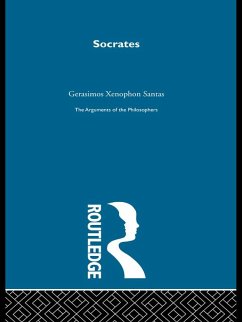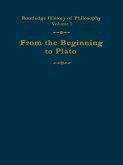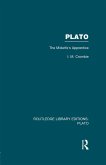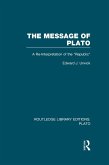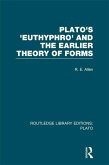Santas
Socrates - Arguments of the Philosophers (eBook, ePUB)
57,95 €
57,95 €
inkl. MwSt.
Sofort per Download lieferbar

29 °P sammeln
57,95 €
Als Download kaufen

57,95 €
inkl. MwSt.
Sofort per Download lieferbar

29 °P sammeln
Jetzt verschenken
Alle Infos zum eBook verschenken
57,95 €
inkl. MwSt.
Sofort per Download lieferbar
Alle Infos zum eBook verschenken

29 °P sammeln
Santas
Socrates - Arguments of the Philosophers (eBook, ePUB)
- Format: ePub
- Merkliste
- Auf die Merkliste
- Bewerten Bewerten
- Teilen
- Produkt teilen
- Produkterinnerung
- Produkterinnerung

Bitte loggen Sie sich zunächst in Ihr Kundenkonto ein oder registrieren Sie sich bei
bücher.de, um das eBook-Abo tolino select nutzen zu können.
Hier können Sie sich einloggen
Hier können Sie sich einloggen
Sie sind bereits eingeloggt. Klicken Sie auf 2. tolino select Abo, um fortzufahren.

Bitte loggen Sie sich zunächst in Ihr Kundenkonto ein oder registrieren Sie sich bei bücher.de, um das eBook-Abo tolino select nutzen zu können.
First Published in 1999. Routledge is an imprint of Taylor & Francis, an informa company.
- Geräte: eReader
- mit Kopierschutz
- eBook Hilfe
- Größe: 0.77MB
Andere Kunden interessierten sich auch für
![Plato and Socrates (RLE: Plato) (eBook, ePUB) Plato and Socrates (RLE: Plato) (eBook, ePUB)]() Richard MckirahanPlato and Socrates (RLE: Plato) (eBook, ePUB)48,95 €
Richard MckirahanPlato and Socrates (RLE: Plato) (eBook, ePUB)48,95 €![Routledge History of Philosophy Volume II (eBook, ePUB) Routledge History of Philosophy Volume II (eBook, ePUB)]() David FurleyRoutledge History of Philosophy Volume II (eBook, ePUB)45,95 €
David FurleyRoutledge History of Philosophy Volume II (eBook, ePUB)45,95 €![Routledge History of Philosophy Volume I (eBook, ePUB) Routledge History of Philosophy Volume I (eBook, ePUB)]() Routledge History of Philosophy Volume I (eBook, ePUB)44,95 €
Routledge History of Philosophy Volume I (eBook, ePUB)44,95 €![Plato: The Midwife's Apprentice (RLE: Plato) (eBook, ePUB) Plato: The Midwife's Apprentice (RLE: Plato) (eBook, ePUB)]() I. CrombiePlato: The Midwife's Apprentice (RLE: Plato) (eBook, ePUB)48,95 €
I. CrombiePlato: The Midwife's Apprentice (RLE: Plato) (eBook, ePUB)48,95 €![Plato: The Man and His Work (RLE: Plato) (eBook, ePUB) Plato: The Man and His Work (RLE: Plato) (eBook, ePUB)]() A. E. TaylorPlato: The Man and His Work (RLE: Plato) (eBook, ePUB)47,95 €
A. E. TaylorPlato: The Man and His Work (RLE: Plato) (eBook, ePUB)47,95 €![The Message of Plato (RLE: Plato) (eBook, ePUB) The Message of Plato (RLE: Plato) (eBook, ePUB)]() Edward UrwickThe Message of Plato (RLE: Plato) (eBook, ePUB)46,95 €
Edward UrwickThe Message of Plato (RLE: Plato) (eBook, ePUB)46,95 €![Plato's Euthyphro and the Earlier Theory of Forms (RLE: Plato) (eBook, ePUB) Plato's Euthyphro and the Earlier Theory of Forms (RLE: Plato) (eBook, ePUB)]() R. AllenPlato's Euthyphro and the Earlier Theory of Forms (RLE: Plato) (eBook, ePUB)57,95 €
R. AllenPlato's Euthyphro and the Earlier Theory of Forms (RLE: Plato) (eBook, ePUB)57,95 €-
-
-
First Published in 1999. Routledge is an imprint of Taylor & Francis, an informa company.
Dieser Download kann aus rechtlichen Gründen nur mit Rechnungsadresse in A, B, BG, CY, CZ, D, DK, EW, E, FIN, F, GR, HR, H, IRL, I, LT, L, LR, M, NL, PL, P, R, S, SLO, SK ausgeliefert werden.
Produktdetails
- Produktdetails
- Verlag: Taylor & Francis eBooks
- Seitenzahl: 360
- Erscheinungstermin: 13. Juli 2010
- Englisch
- ISBN-13: 9781136956584
- Artikelnr.: 43074032
- Verlag: Taylor & Francis eBooks
- Seitenzahl: 360
- Erscheinungstermin: 13. Juli 2010
- Englisch
- ISBN-13: 9781136956584
- Artikelnr.: 43074032
- Herstellerkennzeichnung Die Herstellerinformationen sind derzeit nicht verfügbar.
Gerasimos Xenophon Santas
Part One THE PHILOSOPHER AND THE CITIZEN I Introduction to Plato's Socrates
II Socrates and the Laws of Athens 1 Socrates' arguments in the Crito that
he ought not to escape from jail 2 Socrates' views in the Apology about the
citizen, his city, and its laws 3 Is there any inconsistency between the
Apology and the Crito? Part Two SOCRATIC METHOD III Socratic Questions and
Assumptions 1 A sample of Socrates' questions 2 Questions about Socratic
questions 3 The pragmatics of Socrates' questionings 4 The syntactics of
Socrates' questions 5 The semantics of Socrates' questions IV Socratic
Definitions 1 A list of all the definitions in the Socratic Dialogues 2 The
syntax and forms of Socratic definitions 3 The semantics of Socratic
definitions 4 The pragmatics of Socratic definitions 5 Criteria for
adequate Socratic definitions V Socratic Arguments 1 Variety of arguments 2
Method of analyzing arguments 3 Inductive analogies: from the
arts-crafts-sciences to ethics 4 Inductive generalizations: from the
arts-crafts-sciences to ethics 5 Deductive arguments: two indirect
arguments from the Lysis 6 Deductive arguments: a direct argument from the
Lysis 7 Deductive arguments: a direct argument from the Protagoras Part
Three SOCRATIC ETHICS VI Virtue and Knowledge I: The Socratic Paradoxes 1
The distinction between the prudential and the moral paradox 2 The
prudential paradox 3 The moral paradox VII Virtue and Knowledge II: An
Argument against Explanations of Weakness 1 The context and the strategy 2
The argument 3 Application of the argument to other cases 4 The strength
model 5 Weakness and compulsion VIII Power, Virtue, Pleasure, and Happiness
in the Gorgias 1 The issues of vittue and happiness 2 Socrates' arguments
that the unjust man is unhappy 3 Goods and evils and happiness and
unhappiness: Socrates and Polus 4 Callicles' view of virtue, pleasure, and
happiness 5 Socrates' attack on Callicles' view: the arguments against
justice by nature, and against hedonism 6 Virtue as health of the soul and
justice as medicine
II Socrates and the Laws of Athens 1 Socrates' arguments in the Crito that
he ought not to escape from jail 2 Socrates' views in the Apology about the
citizen, his city, and its laws 3 Is there any inconsistency between the
Apology and the Crito? Part Two SOCRATIC METHOD III Socratic Questions and
Assumptions 1 A sample of Socrates' questions 2 Questions about Socratic
questions 3 The pragmatics of Socrates' questionings 4 The syntactics of
Socrates' questions 5 The semantics of Socrates' questions IV Socratic
Definitions 1 A list of all the definitions in the Socratic Dialogues 2 The
syntax and forms of Socratic definitions 3 The semantics of Socratic
definitions 4 The pragmatics of Socratic definitions 5 Criteria for
adequate Socratic definitions V Socratic Arguments 1 Variety of arguments 2
Method of analyzing arguments 3 Inductive analogies: from the
arts-crafts-sciences to ethics 4 Inductive generalizations: from the
arts-crafts-sciences to ethics 5 Deductive arguments: two indirect
arguments from the Lysis 6 Deductive arguments: a direct argument from the
Lysis 7 Deductive arguments: a direct argument from the Protagoras Part
Three SOCRATIC ETHICS VI Virtue and Knowledge I: The Socratic Paradoxes 1
The distinction between the prudential and the moral paradox 2 The
prudential paradox 3 The moral paradox VII Virtue and Knowledge II: An
Argument against Explanations of Weakness 1 The context and the strategy 2
The argument 3 Application of the argument to other cases 4 The strength
model 5 Weakness and compulsion VIII Power, Virtue, Pleasure, and Happiness
in the Gorgias 1 The issues of vittue and happiness 2 Socrates' arguments
that the unjust man is unhappy 3 Goods and evils and happiness and
unhappiness: Socrates and Polus 4 Callicles' view of virtue, pleasure, and
happiness 5 Socrates' attack on Callicles' view: the arguments against
justice by nature, and against hedonism 6 Virtue as health of the soul and
justice as medicine
Part One THE PHILOSOPHER AND THE CITIZEN I Introduction to Plato's Socrates
II Socrates and the Laws of Athens 1 Socrates' arguments in the Crito that
he ought not to escape from jail 2 Socrates' views in the Apology about the
citizen, his city, and its laws 3 Is there any inconsistency between the
Apology and the Crito? Part Two SOCRATIC METHOD III Socratic Questions and
Assumptions 1 A sample of Socrates' questions 2 Questions about Socratic
questions 3 The pragmatics of Socrates' questionings 4 The syntactics of
Socrates' questions 5 The semantics of Socrates' questions IV Socratic
Definitions 1 A list of all the definitions in the Socratic Dialogues 2 The
syntax and forms of Socratic definitions 3 The semantics of Socratic
definitions 4 The pragmatics of Socratic definitions 5 Criteria for
adequate Socratic definitions V Socratic Arguments 1 Variety of arguments 2
Method of analyzing arguments 3 Inductive analogies: from the
arts-crafts-sciences to ethics 4 Inductive generalizations: from the
arts-crafts-sciences to ethics 5 Deductive arguments: two indirect
arguments from the Lysis 6 Deductive arguments: a direct argument from the
Lysis 7 Deductive arguments: a direct argument from the Protagoras Part
Three SOCRATIC ETHICS VI Virtue and Knowledge I: The Socratic Paradoxes 1
The distinction between the prudential and the moral paradox 2 The
prudential paradox 3 The moral paradox VII Virtue and Knowledge II: An
Argument against Explanations of Weakness 1 The context and the strategy 2
The argument 3 Application of the argument to other cases 4 The strength
model 5 Weakness and compulsion VIII Power, Virtue, Pleasure, and Happiness
in the Gorgias 1 The issues of vittue and happiness 2 Socrates' arguments
that the unjust man is unhappy 3 Goods and evils and happiness and
unhappiness: Socrates and Polus 4 Callicles' view of virtue, pleasure, and
happiness 5 Socrates' attack on Callicles' view: the arguments against
justice by nature, and against hedonism 6 Virtue as health of the soul and
justice as medicine
II Socrates and the Laws of Athens 1 Socrates' arguments in the Crito that
he ought not to escape from jail 2 Socrates' views in the Apology about the
citizen, his city, and its laws 3 Is there any inconsistency between the
Apology and the Crito? Part Two SOCRATIC METHOD III Socratic Questions and
Assumptions 1 A sample of Socrates' questions 2 Questions about Socratic
questions 3 The pragmatics of Socrates' questionings 4 The syntactics of
Socrates' questions 5 The semantics of Socrates' questions IV Socratic
Definitions 1 A list of all the definitions in the Socratic Dialogues 2 The
syntax and forms of Socratic definitions 3 The semantics of Socratic
definitions 4 The pragmatics of Socratic definitions 5 Criteria for
adequate Socratic definitions V Socratic Arguments 1 Variety of arguments 2
Method of analyzing arguments 3 Inductive analogies: from the
arts-crafts-sciences to ethics 4 Inductive generalizations: from the
arts-crafts-sciences to ethics 5 Deductive arguments: two indirect
arguments from the Lysis 6 Deductive arguments: a direct argument from the
Lysis 7 Deductive arguments: a direct argument from the Protagoras Part
Three SOCRATIC ETHICS VI Virtue and Knowledge I: The Socratic Paradoxes 1
The distinction between the prudential and the moral paradox 2 The
prudential paradox 3 The moral paradox VII Virtue and Knowledge II: An
Argument against Explanations of Weakness 1 The context and the strategy 2
The argument 3 Application of the argument to other cases 4 The strength
model 5 Weakness and compulsion VIII Power, Virtue, Pleasure, and Happiness
in the Gorgias 1 The issues of vittue and happiness 2 Socrates' arguments
that the unjust man is unhappy 3 Goods and evils and happiness and
unhappiness: Socrates and Polus 4 Callicles' view of virtue, pleasure, and
happiness 5 Socrates' attack on Callicles' view: the arguments against
justice by nature, and against hedonism 6 Virtue as health of the soul and
justice as medicine
